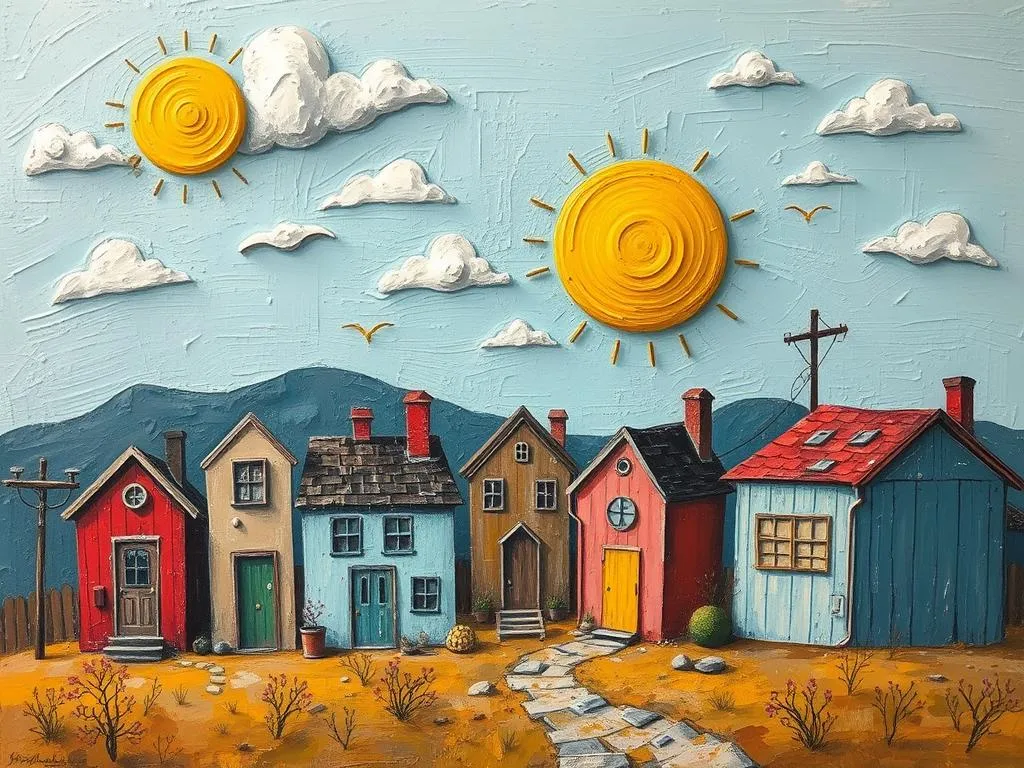
Have you ever found yourself wandering through a dilapidated street in a dream, surrounded by crumbling buildings and an air of neglect? The image of poor neighborhoods can be jarring, stirring feelings of unease or nostalgia. While it might simply feel like a reflection of your surroundings, dreams involving impoverished areas often carry deeper meanings. They can symbolize your fears, aspirations, and even your personal growth.
In this article, we’ll explore the symbolism behind dreaming of poor neighborhoods, delve into various experiences, and uncover how these dreams can serve as a catalyst for your personal development. Let’s embark on this journey together, shedding light on the hidden messages within your dreams.
Urban Shadows: Understanding the Symbolism
When you dream of poor neighborhoods, the symbolism can be rich and multifaceted. These dreams often reflect feelings of inadequacy, loss, and struggle. They may arise from personal experiences or societal observations, pointing to a fear of deprivation or a longing for something better.
-
Societal Reflection: Poor neighborhoods can symbolize the state of your surroundings or the broader societal issues that weigh on your mind. They may represent economic challenges, inequality, and the harsh realities faced by many. If you’re particularly aware of social justice issues, these dreams may be your mind’s way of processing these concerns.
-
Personal Struggles: On a more intimate level, dreams of dilapidated neighborhoods can signify your own internal struggles. They may reflect your feelings of being stuck in a cycle of negativity or hardship. If you’re feeling trapped in your current situation—be it in your career, relationships, or personal growth—these dreams might surface as a way of bringing your attention to these feelings.
-
Fear of Failure: You may also dream of poor neighborhoods as a manifestation of your fears about failure. The imagery can evoke feelings of insecurity and self-doubt, suggesting that you’re worried about not achieving your goals or falling behind in life. This fear can be paralyzing, causing you to avoid taking risks that could lead to growth.
-
Desire for Change: Conversely, dreams about impoverished areas can symbolize a desire for change. They may indicate that you recognize the need to break free from limiting beliefs or environments that no longer serve you. This can be a powerful call to action, urging you to seek out opportunities that align more closely with your true self.
-
Reconnecting with Your Roots: Sometimes, these dreams may also invite you to reflect on your background or upbringing. They can remind you of where you come from and how those experiences have shaped your current identity. Embracing your past can be a vital step in understanding your present and forging a path forward.
Wandering the Streets: Experiences in Context
Dreams are often colored by personal experiences, and the context of your dream can significantly alter its meaning. Let’s explore a few scenarios involving poor neighborhoods and the messages they might convey.
-
Lost in a Familiar Area: You find yourself wandering through a neighborhood that resembles one from your childhood—only it appears neglected and dilapidated. This dream may indicate a longing for your past or a sense of nostalgia for simpler times. It could also suggest that you’re grappling with unresolved feelings linked to your upbringing, urging you to confront and heal those aspects of your life.
-
Helping Others: In your dream, you are actively helping residents in a poor neighborhood—distributing food or assisting with repairs. This scenario highlights your innate compassion and desire to make a difference. It may signal a need to engage with social issues or reflect on how you can contribute positively to your community.
-
Running from Danger: You find yourself fleeing through a rundown neighborhood, feeling threatened by unseen forces. This dream might indicate that you’re feeling overwhelmed by external pressures or internal fears. It suggests a need to confront what you’re running from—whether it’s responsibilities, relationships, or emotional turmoil—rather than avoiding them.
-
Despair and Isolation: In another dream, you walk through empty streets, filled with despair and isolation. This scenario could symbolize feelings of loneliness or abandonment in your waking life. It may encourage you to reach out to supportive friends or family members, reminding you that you don’t have to face your struggles alone.
-
Transforming the Environment: You envision a poor neighborhood being revitalized, with new buildings and a thriving community. This dream reflects a strong desire for transformation—both in your life and the lives of others around you. It’s a powerful reminder that change is possible and that you have the ability to manifest positive outcomes.
Building Bridges: Pathways to Personal Growth
Dreaming of poor neighborhoods can often catalyze introspection and personal growth. By understanding the underlying messages of these dreams, you can take actionable steps towards self-improvement and fulfillment. Here are some insights on how to harness the power of these dreams for your journey:
-
Reflect on Your Feelings: Take time to journal about your dreams and the emotions they evoke. Are you feeling anxious, nostalgic, or inspired? Understanding the feelings associated with your dreams can provide clarity on what areas of your life may need attention or transformation.
-
Set Intentions for Change: If your dreams highlight feelings of inadequacy or stagnation, consider setting intentions for change. What steps can you take to improve your current situation? Whether it’s pursuing a new career path, nurturing relationships, or embarking on a personal project, establishing actionable goals can help you move forward.
-
Cultivate Empathy: Dreams involving poor neighborhoods may evoke a sense of social responsibility. Use these insights to cultivate empathy towards those less fortunate. Engage in community service, donate to charitable causes, or simply practice kindness in your daily interactions. This can not only help others but also enrich your own life.
-
Confront Your Fears: If your dreams are driven by feelings of fear or inadequacy, consider facing those fears head-on. Identify what you’re avoiding and take small steps to confront those challenges. This can lead to significant growth and a renewed sense of empowerment.
-
Reconnect with Your Roots: Use your dreams as an opportunity to reconnect with your background. Reflect on the experiences that have shaped you and consider how they influence your current choices. Embracing your past can foster a sense of gratitude and help you navigate your future with greater clarity.
As you explore the significance of poor neighborhoods in your dreams, remember that they can serve as powerful mirrors, reflecting your fears, desires, and aspirations. By understanding the messages behind these dreams, you can embark on a journey of self-discovery, transformation, and growth.
In conclusion, the imagery of poor neighborhoods in your dreams can be a profound invitation to reflect on your life’s trajectory. Whether it’s confronting your fears, recognizing your strengths, or nurturing your compassion, these dreams offer valuable insights. May you find the courage to explore the depths of your subconscious and emerge stronger, wiser, and more attuned to your true self.







